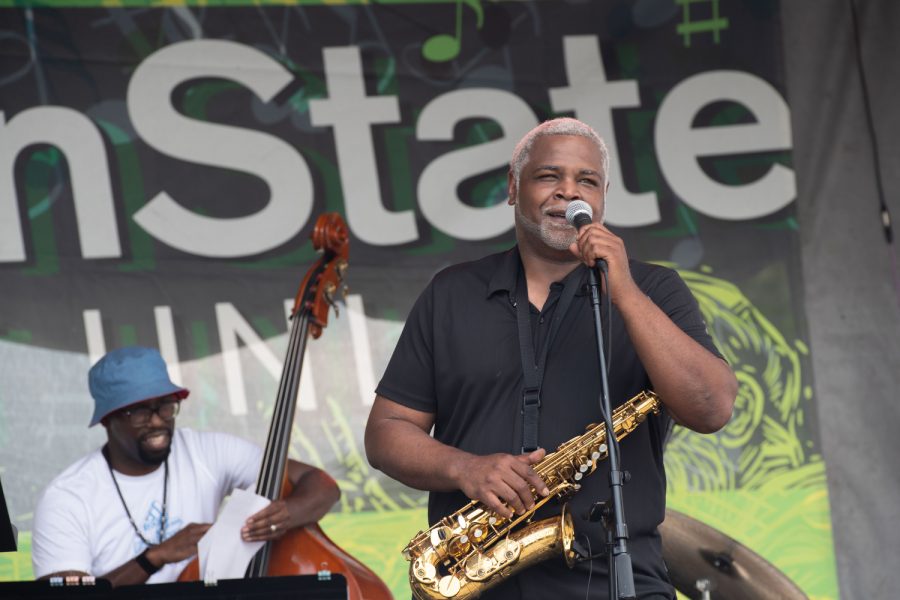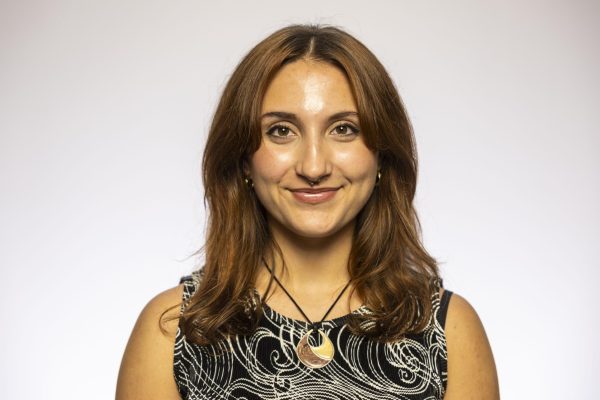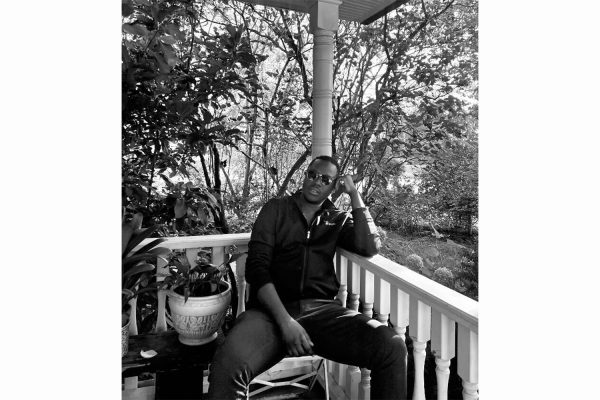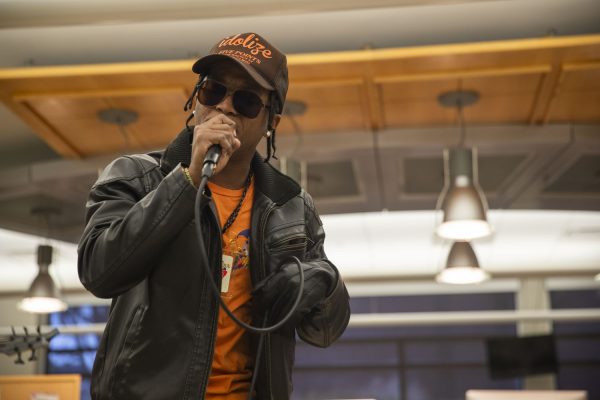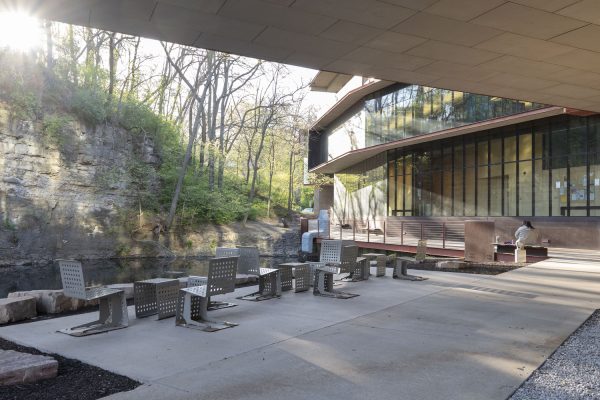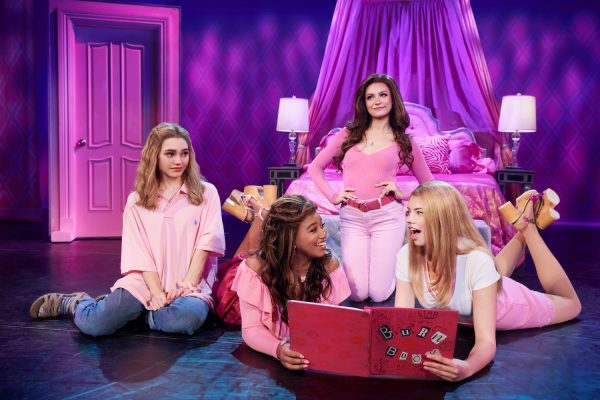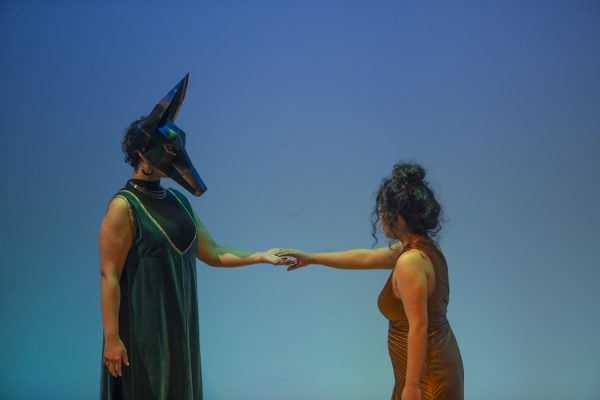Exploring the soul of jazz: a conversation on the culture of jazz in Iowa City
Associate Professor Damani Phillips of the Damani Phillips Quartet shares his journey as a jazz saxophonist, navigating Iowa City’s music scene, and the dichotomy between jazz’s roots and its academic teaching.
Damani Phillips plays the saxophone during the 2023 Iowa City Jazz Festival in Iowa City on Saturday, July 2, 2023.
July 5, 2023
In the week leading up to this year’s Iowa City Jazz Fest, The Daily Iowan spoke with Damani Phillips, a local jazz saxophonist and associate professor of African-American studies at the University of Iowa, about his experience as a Black jazz musician in Iowa City and as the first African-American man to earn a doctorate in jazz from the University of Colorado Boulder.
Phillips performed at Jazz Fest on Sunday, July 2 alongside Cassius Goens on the drums, Brandon Meeks on bass, and Steve Shanley on piano.
DI: You have been learning different musical instruments — specifically the saxophone — since you were 10 years old. Why the saxophone?
Damani Phillips: Well, I started playing the saxophone because my older brother chose saxophone, and I wanted to be like my older brother, but he had quit playing and I took off like a rocket. I knew really early on what I was supposed to do. My parents weren’t as happy about that as I was, but they eventually realized I was meant to do music. However, I didn’t play any jazz until the year 2000. I was all classical music and eventually had an epiphany in terms of the practicality of playing classical saxophone. Then, I kind of stumbled into jazz and fell in love with it right away. You always hope your journey is a straight line but, more times than not, it never ends up working out that way.
DI: In that case, and aside from your older brother, who were your main influences growing up? How did or do they shape your style?
Phillips: I was entirely classical music in the beginning, so it was people like Donald Sinta who nobody knows of because, in the classical saxophone world, those aren’t names that we speak about on a regular basis. But, as I transitioned over to jazz, weirdly enough, I just kind of stumbled into people that I liked along the way. The first person I really fell in love with was Charlie Parker, one of the most notable saxophone players, before I found this band called Spirogyra, which would best be classified as what we now call smooth jazz. Then, I found Cannonball Adderly who, if there’s any one player who I kind of owe the most to in terms of how I play and how I conceive the music, it would be him.
DI: Can you take me through your own creative process when it comes to making music?
Phillips: As a musician, you can go down the esoteric route of jazz that is fascinating intellectually but it only speaks to a select pocket of people. We’re just playing our feelings in the form of notes, and I have to hope the string of notes that I’ve chosen says what I’m feeling at that moment without the benefit of words to clarify those feelings. Making music is supposed to be self-gratifying in some way because it gives you a medium to let those feelings out, but we as musicians need to be making an attempt to communicate with folks who are not trained musicians. Otherwise, we’re talking to ourselves, and it becomes an echo chamber that ends up being a problem for the longevity of the genre. It’s a two-way street, and it’s a big part of my approach to making music; it’s about connection and communication.
DI: To speak to your point about keeping the genre alive, I’ve noticed there are so few opportunities in Iowa City to experience jazz besides the annual summer festival. As a resident of Iowa City and a musician, what does the annual Jazz Festival mean to you, especially after the loss of The Mill?
Phillips: A big part of the jazz program that we’re building here at the school of music is focused on getting students out and playing in front of people. So, we are actively trying to cultivate new opportunities here in Iowa City so that jazz isn’t so far and few between. After The Mill closed down during the pandemic, we were without a venue that was receptive and open to jazz music. We’ve started to cultivate new relationships with different venues around the city so that jazz isn’t such a difficult thing to track down…[Jazz Fest] is one of the longest-standing festivals in the state so it is fantastic to have to know that we’ve got a festival in our city where they can bring in a crowd. It’s always a beautiful thing to have a festival of that stature and of that quality right here in your backyard, but it’s a once-a-year thing, so we have to make sure that we maintain and capitalize on that.
DI: Can you talk more about the cultural erasure you experienced while studying jazz in academia?
Phillips: When jazz was allowed into the academy, the academy wanted nothing to do with it. It fought very hard to exclude jazz from the equation. Eventually, it accepted jazz music only as a commodity that drew people in yet didn’t let in any of the people who were responsible for creating it. The academy likes to break things down into digestible bits of things that can be concretely graded as “A,” “B,” “C,” “D,” and “E,” but the real spirit of jazz lives in the intangibles and the essence of emotional expression. In the Black community, nobody cares about whether or not you played the right note over this scale. It’s the question of, “Was it successful in expressing that emotion?” This is the very core of what makes the music unique and separates it from everything else on the planet, and those unique elements are largely coming from African American music culture. So, a lot of times you’re being taught a hollow shell of what jazz is and leaving out the very things that are at the soul of what makes the music.
DI: When you teach your curriculum, how do you bridge that gap?
Phillips: It’s really simple. The history of jazz and Black music culture are fused together, so I speak to my students so that they understand the music from a unique perspective that haven’t really heard much before with the hope that they move forward. I explain to them that people who aren’t trained musicians couldn’t care less about them playing a sharp nine over top of a dominant seven flat — they’re not celebrating that, but they’ll understand that emotional angst that you generate. It’s a reintegration of the music so that the music and the culture are one and the same which, from the beginning, is how it’s always been.



